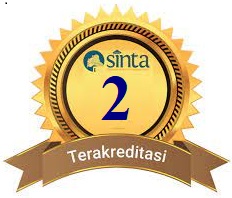Potensi dan Strategi Pengembangan Usaha Tani Perkotaan dalam Meningkatkan Akses Pangan yang Berkelanjutan di Kecamatan Gunung Putri, Kabupaten Bogor
Abstract
As a densely populated industrial area in Bogor Regency, an urban farming program has been initiated in Gunung Putri District. The right strategy to develop and implement urban farming needs to be known so that this program is successful and sustain in Bogor Regency. This study aims to (1) identify aspects of preparation for urban farming development in Gunung Putri District, Bogor Regency; (2) analyze people's perceptions of its development; (3) and formulate its development strategy through qualitative descriptive methods, Likert scale, and SWOT analysis. Based on technical, social, institutional, commercial, financial, and environmental aspects, urban farming activities in this location are potential to be developed to support food adequacy and contribute to household income. The society has an excellent perception of the benefits. However, the community also saw obstacles, including the availability of respondents' time, usable land, capital, and supportive institutions. Most respondents also perceived that the currently limited information related to marketing has the potential to hinder the successful implementation of the urban farming. Nevertheless, the community's desire to participate is quite high, and they will participate if the program is implemented. The highest strength factor in developing urban farming businesses in Gunung Putri District is the public knowledge about cultivation techniques, while the most significant weakness is the marketing of its products. An enormous opportunity is to establish networking with various parties, and the biggest threat is the trend of urban life that does not focus on the agricultural sector.
Keywords: aspects of feasibility, community perception, urban farming, SWOT analysis
Downloads
References
Apriana C, Lasmono Tri Sunaryanto. 2021. Strategi ketahanan usaha bale hidroponik Bale hydroponic businnes resilince strategy. AGRILAND Jurnal Ilmu Pertanian 9(2): 45‒52
[BPS] Badan Pusat Statistik Kabupaten Bogor. 2021. Kabupaten Bogor Dalam Angka 2021. Jakarta (ID)
[BPS] Badan Pusat Statistik Kabupaten Bogor. 2021. Kecamatan Gunung Putri Dalam Angka 2021. Bogor (ID).
Cahya DL. 2016. Analysis of Urban Agriculture Sustainability in Metropolitan Jakarta (Case Study: Urban Agriculture in Duri Kosambi). Procedia-Social and Behavioral Sciences. 227: 95–100. https:// doi.org/10.1016/j.sbspro.2016.06.048
David, Fred R. 2011. Strategic Management Manajemen Strategi Konsep, Edisi 12. Jakarta (ID): Salemba Empat.
David F. 2004. Strategic Management. Concepts and Cases. New Jersey (EN): Prentice Hall.
FAO. 1999. The urban producer’s resource book. A practical guide for working with Low Income Urban and Peri-Urban Producers Organizations. Rome (EN).
Feriatin. 2017. Keanekaragaman tanaman pekarangan dan pemanfaatannya untuk mendukung ketahanan pangan Kecamatan Wakorumba Selatan. Jurnal Ilmu Pengetahuan Pertanian Indonesia (JIPI). 22(2): 99107. https://doi.org/10.18343/jipi.22. 2.99
[FAO] Food and Agriculture Organization. 2003. Urban Agriculture for Sustainable Poverty Alleviation and Food Security. 84.
Gittinger JP. 2008. Analisa Ekonomi Proyek-Proyek Pertanian. Jakarta (ID): UI Press.
Ikhsan S, Aid A. 2011. Analisis SWOT untuk merumuskan strategi pengembangan komoditas karet di Kabupaten Pulang Pisau, Kalimantan Tengah. Jurnal Agribisnis Pedesaan. 1(3): 166177
Irwan SNR, Rogomulyo R, Trisnowati S. 2018. Pemanfaatan pekarangan melalui pengembangan lanskap produktif di Desa Mangunan, Kabupaten Bantul Yogyakarta. Jurnal Ilmu Pengetahuan Pertanian Indonesia. 23(2): 148157. https:// doi.org/10.18343/jipi.23.2.148
Khasanah N. 2021. Urban farming sebagai upaya peningkatan ekonomi Sulampua. Medkonis: Jurnal Media Komunikasi dan Bisnis. 2723‒648X. https://doi.org/10.52659/medikonis.v12i2.39
Kilmanun CJ. 2018. Sistem pemasaran sayuran hidroponik di Kalimantan Barat. Jurnal Pertanian Agros. 20(2): 147153.
Lievano-Cruz, P. 2020. Urban farming as a driver for sustainable development. [Tesis]. Groningen (NL): University of Groningen
Meenar MR, Hoover BM. 2012. Community food security via urban agriculture: Understanding people, place, economy, and accessibility from a food justice perspective. Journal of Agriculture, Food Systems, and Community Development. 3(1): 143–160. https://doi.org/10.5304/jafscd.2012. 031.013
Pribadi DO, Pauleit S. 2016. Peri-urban agriculture in Jabodetabek Metropolitan Area and its relationship with the urban socioeconomic system. Land Use Policy. 55: 265–274. https://doi.org/10.1016/ j.landusepol.2016.04.008
Smith J, Nasr JRA. 2001. Urban Agriculture Food, Jobs and Sustainable Cities 2001 Chapter 2. New York (US): United Nations Development Programme (UNDP).
Soekartawi. 2002. Analisis Usahatani. Jakarta (ID): Universitas Indonesia.
Sampeliling S, Sitorus SRP, Nurisyah S, dan Pramudya B. 2012. Kebijakan pengembangan pertanian kota berkelanjutan: Studi kasus di DKI Jakarta. Analisis Kebijakan Pertanian. 10(3): 257267. https://doi.org/10.21082/akp.v10n3. 2012.257-267
Sugiyono. 2011. Metode Penelitian Kuantitatif Kualitatif dan R&D. Bandung (ID): Alfabeta
Surya B, Syafri S, Hadijah H, Baharuddin B, Fitriyah AT, Sakti HH. 2020. Management of slum-based urban farming and economic empowerment of the community of Makassar City, South Sulawesi, Indonesia. Sustainability. 12(18): 1‒42. https:// doi.org/10.3390/su12187324
[USEPA] US Environmental Protection Agency. 2011. Reducing Greenhouse Gas Emissions through Recycling and Composting. Seattle, WA: U.S. EPA Region 10.
Undang-Undang Nomor 22 Tahun 2019 tentang Sistem Budi Daya Pertanian Berkelanjutan. Jakarta (ID).
This journal is published under the terms of the Creative Commons Attribution-NonCommercial 4.0 International License. Authors who publish with this journal agree to the following terms: Authors retain copyright and grant the journal right of first publication with the work simultaneously licensed under a Creative Commons Attribution-NonCommercial 4.0 International License. Attribution — You must give appropriate credit, provide a link to the license, and indicate if changes were made. You may do so in any reasonable manner, but not in any way that suggests the licensor endorses you or your use. NonCommercial — You may not use the material for commercial purposes.























